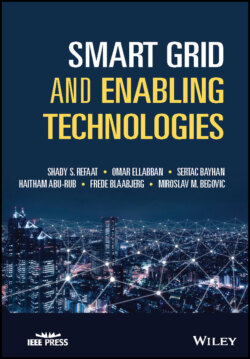Читать книгу Smart Grid and Enabling Technologies - Frede Blaabjerg - Страница 49
1.9.2 Decentralization
ОглавлениеDecentralization is the transformation of the bulk, “one‐way direction” of energy into a distributed, multi‐directional flows, known as multi‐lane highways [65]. A decentralized electrical grid has several environmental and security benefits. Microgrids coordinated with distributed energy generation give systems significantly enhanced reliability and grid efficiency. Distributed power generation and microgrids are independent of the grid which means this power is provided to the local loads even when the main grid is not available. Decentralized generation allows the reduction of power outages for critical facilities, for instance, hospitals or police stations or any facility that may need continuous power. Hence, decentralized grids are more energy‐efficient than centralized electricity grids [47]. Consequently, implementing renewable energy sources in the current power grid does not automatically imply that the current power grid is decentralized. The transformation from a centralized to a decentralized electricity grid requires a number of technologies with various implications that need to be considered to become a reality such as [66]:
1 Distributed generation (from renewable energy resources).
2 Distributed storage.
3 DR.
